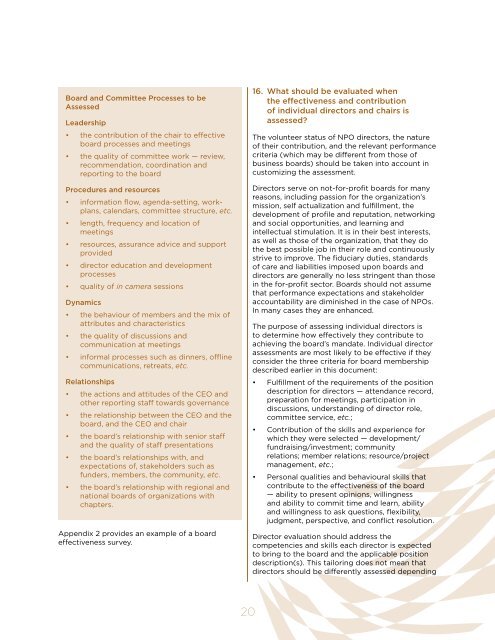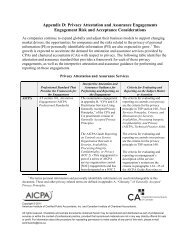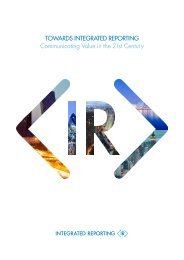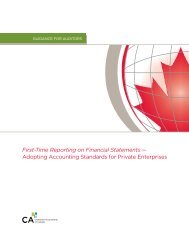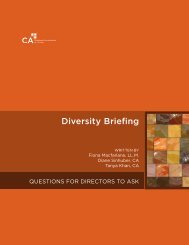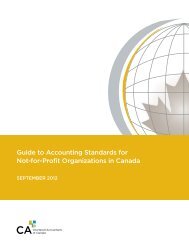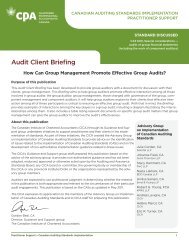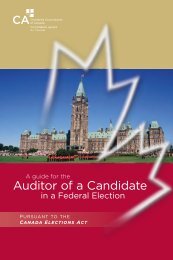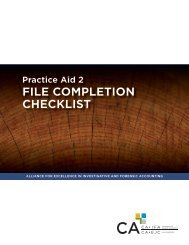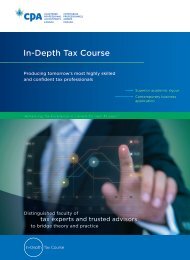20 Questions Directors of Not-for-Profit Organizations Should Ask ...
20 Questions Directors of Not-for-Profit Organizations Should Ask ...
20 Questions Directors of Not-for-Profit Organizations Should Ask ...
Create successful ePaper yourself
Turn your PDF publications into a flip-book with our unique Google optimized e-Paper software.
Board and Committee Processes to be<br />
Assessed<br />
Leadership<br />
• the contribution <strong>of</strong> the chair to effective<br />
board processes and meetings<br />
• the quality <strong>of</strong> committee work — review,<br />
recommendation, coordination and<br />
reporting to the board<br />
Procedures and resources<br />
• in<strong>for</strong>mation flow, agenda-setting, workplans,<br />
calendars, committee structure, etc.<br />
• length, frequency and location <strong>of</strong><br />
meetings<br />
• resources, assurance advice and support<br />
provided<br />
• director education and development<br />
processes<br />
• quality <strong>of</strong> in camera sessions<br />
Dynamics<br />
• the behaviour <strong>of</strong> members and the mix <strong>of</strong><br />
attributes and characteristics<br />
• the quality <strong>of</strong> discussions and<br />
communication at meetings<br />
• in<strong>for</strong>mal processes such as dinners, <strong>of</strong>fline<br />
communications, retreats, etc.<br />
Relationships<br />
• the actions and attitudes <strong>of</strong> the CEO and<br />
other reporting staff towards governance<br />
• the relationship between the CEO and the<br />
board, and the CEO and chair<br />
• the board’s relationship with senior staff<br />
and the quality <strong>of</strong> staff presentations<br />
• the board’s relationships with, and<br />
expectations <strong>of</strong>, stakeholders such as<br />
funders, members, the community, etc.<br />
• the board’s relationship with regional and<br />
national boards <strong>of</strong> organizations with<br />
chapters.<br />
Appendix 2 provides an example <strong>of</strong> a board<br />
effectiveness survey.<br />
16. What should be evaluated when<br />
the effectiveness and contribution<br />
<strong>of</strong> individual directors and chairs is<br />
assessed<br />
The volunteer status <strong>of</strong> NPO directors, the nature<br />
<strong>of</strong> their contribution, and the relevant per<strong>for</strong>mance<br />
criteria (which may be different from those <strong>of</strong><br />
business boards) should be taken into account in<br />
customizing the assessment.<br />
<strong>Directors</strong> serve on not-<strong>for</strong>-pr<strong>of</strong>it boards <strong>for</strong> many<br />
reasons, including passion <strong>for</strong> the organization’s<br />
mission, self actualization and fulfillment, the<br />
development <strong>of</strong> pr<strong>of</strong>ile and reputation, networking<br />
and social opportunities, and learning and<br />
intellectual stimulation. It is in their best interests,<br />
as well as those <strong>of</strong> the organization, that they do<br />
the best possible job in their role and continuously<br />
strive to improve. The fiduciary duties, standards<br />
<strong>of</strong> care and liabilities imposed upon boards and<br />
directors are generally no less stringent than those<br />
in the <strong>for</strong>-pr<strong>of</strong>it sector. Boards should not assume<br />
that per<strong>for</strong>mance expectations and stakeholder<br />
accountability are diminished in the case <strong>of</strong> NPOs.<br />
In many cases they are enhanced.<br />
The purpose <strong>of</strong> assessing individual directors is<br />
to determine how effectively they contribute to<br />
achieving the board’s mandate. Individual director<br />
assessments are most likely to be effective if they<br />
consider the three criteria <strong>for</strong> board membership<br />
described earlier in this document:<br />
• Fulfillment <strong>of</strong> the requirements <strong>of</strong> the position<br />
description <strong>for</strong> directors — attendance record,<br />
preparation <strong>for</strong> meetings, participation in<br />
discussions, understanding <strong>of</strong> director role,<br />
committee service, etc.;<br />
• Contribution <strong>of</strong> the skills and experience <strong>for</strong><br />
which they were selected — development/<br />
fundraising/investment; community<br />
relations; member relations; resource/project<br />
management, etc.;<br />
• Personal qualities and behavioural skills that<br />
contribute to the effectiveness <strong>of</strong> the board<br />
— ability to present opinions, willingness<br />
and ability to commit time and learn, ability<br />
and willingness to ask questions, flexibility,<br />
judgment, perspective, and conflict resolution.<br />
Director evaluation should address the<br />
competencies and skills each director is expected<br />
to bring to the board and the applicable position<br />
description(s). This tailoring does not mean that<br />
directors should be differently assessed depending<br />
<strong>20</strong>


